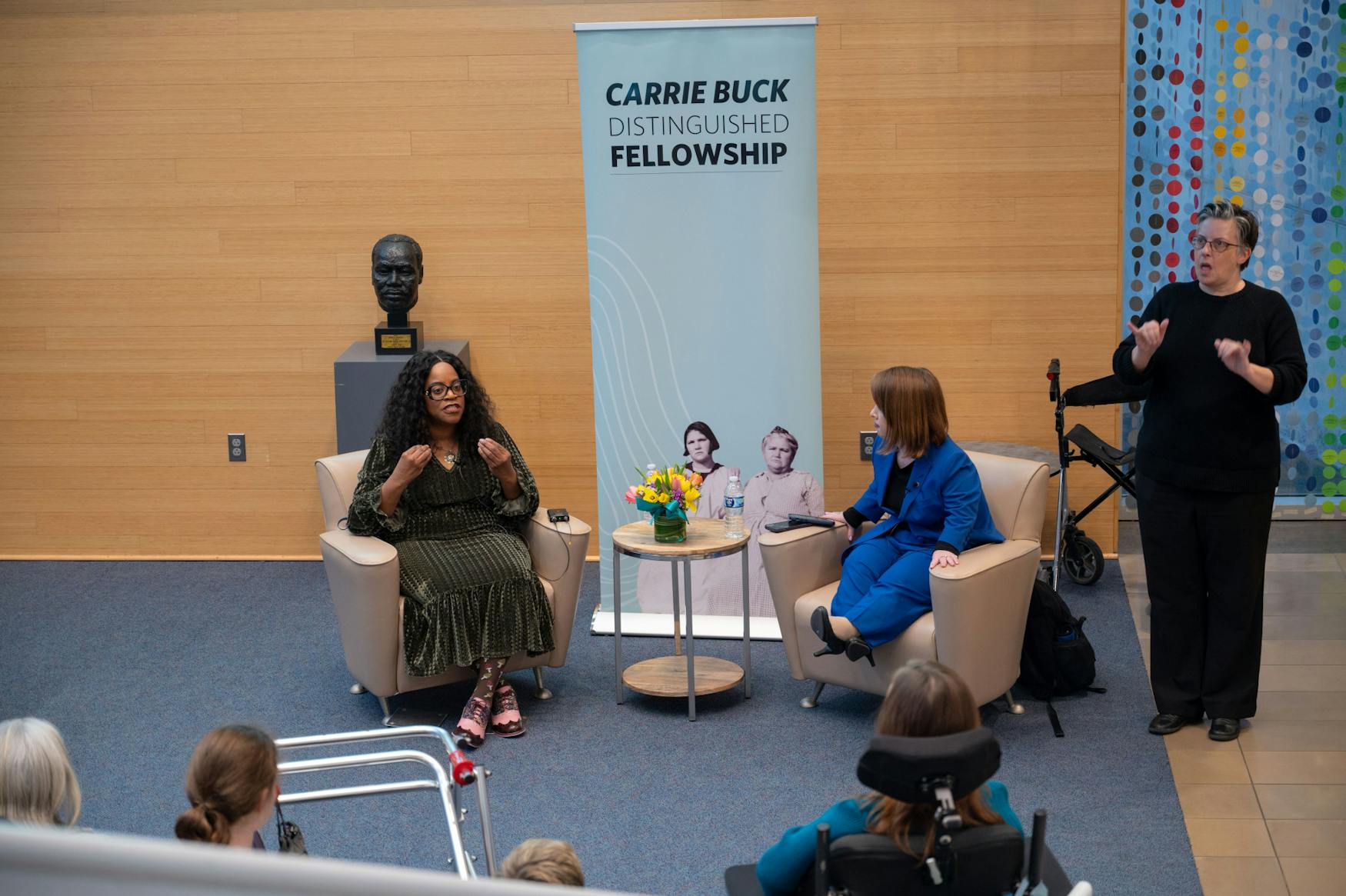Robin Wilson-Beattie awarded Carrie Buck Fellowship Award
The educator and writer was recognized for intersectional disability and reproductive justice advocacy.
Content warning: This article includes mention of rape.
On March 7, Brandeis awarded activist Robin Wilson-Beattie the second annual Carrie Buck Distinguished Fellowship Award. “In social justice movements, disability rights are often an afterthought,” remarked Wilson-Beattie in her opening comments. Yet this recognition of her career in advocacy pertaining to the intersectionality of disability and reproductive justice is a step toward giving this often ignored issue a critical space for discussion. When embarking on her career in educating and speaking up for disability rights, Wilson-Beattie says she was often “told that this wasn’t possible.” Now this award is “a dream manifested” through funding her work and calling attention to the systemic ableism in reproductive health policy.
The award reception on March 7 was structured as a conversation titled “Accessing Reproductive Justice: Using Intersectional Self, Systems, and Community Advocacy to Create Inclusive Sexual and Reproductive Healthcare and Expression.” The discussion was hosted in the Heller School for Social Policy and Management and provided a space for conversations that celebrated both success and potential.
Wilson-Beattie says that the importance of the disability rights movement and the work of Black women with disabilities are often forgotten by mainstream social justice movements. She expressed an emotional realization that this award was her first time being recognized and celebrated for her work, saying that it was “life changing,” and “not only validating for recognizing scholarship and research around disability and sexuality, but validating for [her]... [and proves] that [her] work is important and needed in this area.”
Celebrating the legacy that the Carrie Buck Distinguished Fellowship hopes to build involves recognizing Brandeis’ history and involvement in disability and reproductive rights. Rebecca Cokely, the event’s moderator and the Disability Rights program officer for the Ford Foundation, which funds the fellowship, is partly to thank for the fellowship’s creation. Two years ago, during a celebration of her own work where she received the Richmond Distinguished Fellowship Award, she cited the Supreme Court case Buck v. Bell as an important reminder of how the Brandeis community is deeply tied to disability and reproductive justice.
Carrie Buck, for whom the Fellowship award is dedicated, was involuntarily sterilized after the Court’s ruling in the case of Buck v. Bell, allowing the state of Virginia to codify their 1924 Eugenical Sterilization Act. Prior to this case, Buck was raped by her foster parents’ nephew. Following her pregnancy she was committed to the Virginia Colony for Epileptics and the Feeble Minded, an isolated government-run residential hospital. Five months after giving birth to her daughter, eugenicists then decided to use Buck’s situation as a reason to legitimize Virginia's sterilization law. This verdict, which effectively enabled the forced sterilization of people with disabilities, was signed by Justice Louis D. Brandeis in an 8-1 majority vote. Though a century ago, the Buck v. Bell case demonstrated the systemic ableism present in American society, especially in its healthcare and legal systems. As Cokely remarked, “the topic of sex and disability is still taboo,” which impedes the ability for work to be done in this necessary intersection of healthcare and social justice.
As a Black, disabled mother, Wilson-Beattie has faced her own personal struggles when dealing with the American healthcare system. Inappropriate care and inadequate support from doctors has threatened her reproductive rights and her bodily autonomy. During her conversation with Cokely, she remarked that “in order to exist in society you have to be compliant … [to] authority … [and make] your body convenient for able bodied people.” Cokely added on by noting that “you are never more vulnerable than when you’re on the doctor’s table,” and the marginalization of disabled women, especially disabled women of color, makes the healthcare system a dangerous place to navigate at times.
The conversation was far-reaching in its inclusion of topics that are sometimes considered taboo by educators and in social justice movements. Cokely noted that the seeming unwillingness to talk about sex and disability is largely due to ideas surrounding “the notion of who is deserving and undeserving in [social justice] conversations.” Wilson-Beattie agreed, pointing out that systemic problems revolving around “deciding who gets to have sex, [and] what kind of sex [people] should be having,” while “encasing it in a cloud of questions and secrecy” makes both sex and disability controversial in mainstream society.
Ongoing inequality is especially evident in education, but teaching is also where the most potential lies for productive change. Wilson-Beattie believes that “comprehensive sex education needs to be mandatory for all students.” In addition to implementing better sex education in general, disability-inclusive sex education is necessary and involves “meeting people where they are, [and] adapt[ing] and accommodat[ing] for how they learn to teach them about their bodies and their rights and health.” This equitable approach to sex education is integral to giving young people with disabilities the means to understand and protect their reproductive rights. Wilson-Beattie also stated that “changing how we define sex … and pleasure” through a typically heteronormative lens is essential.
When asked about what the reproductive justice movement can learn from the disability justice movement, Wilson-Beattie called for the “inclusion of the voices of the most marginalized [people] in positions of leadership.” As she put it, “identity impacts how we get to navigate the world” and recognizing the important work of Black women throughout history, who are often the voice for what is happening but not given authority to take action, is especially crucial in regards to reproductive health.
The power of discussion is principal to Wilson-Beattie’s work in making social justice spaces more inclusive and intersectional. Including and uplifting voices of the disability rights movement is fundamental to the ultimate goal of intersectional reproductive justice, which in Wilson-Beattie’s words, is “reproductive happiness” for all bodies.




Please note All comments are eligible for publication in The Justice.